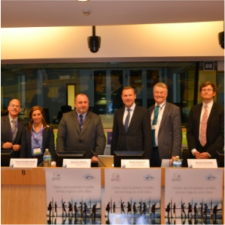One event of particular interest during the Open Days was the EPP/CoR workshop about “Innovative Regions and Cities for Territorial Development,” which was held on the 10th of October with 120 people. The objectives, working process and content are described in the EPP press release below:
“An innovation culture is essential for successful open innovation” participants concluded at the European People’s Party (EPP) Group in the Committee of the Regions (CoR) workshop on innovative regions and cities for territorial development yesterday. The seminar, which aimed to take stock of the potential of regions and cities for smart, sustainable and inclusive growth, identified key areas for improvement and synergy in EU policy funds. “Europe needs to recover from the financial crisis and its regions and cities are the place to start” began Michael Schneider, President of the EPP Group in the Committee of the Regions. “In view of limited public budgets, we should welcome research projects that are jointly run by private companies, universities and research centres” he concluded. The seminar pushed the boundaries of traditional meetings by encouraging collaborative participation through a ‘Meshmoon’ virtual world.
Open innovation and cooperation between different sectors are vitally important to achieving the targets of Europe 2020 Strategy, Constance Hanniffy, Member of Offaly County Council and President of the Monitoring Committee of the Border, Midland and West Regional Assembly, explained. Through the region’s food technology transfer programme, success has been achieved by linking academia and monitoring to product needs and development. Martin Curley, Director of Intel Labs Europe and Chairman of the EU Open Innovation Strategy and Policy Group, drew examples from business to underline that the Internet levels the playing field. “Even small regions can compete on the global market thanks to digital entrepreneurship and technological advances… The network effect is also very important to regions and cities that may not have a large research budget or team available” he stated.
Entrepreneurial spirit, which many speakers emphasized as important for innovation and renewal, was especially clear in the presentation by Nils Paajanen, Aalto University student and President of the Aalto Entrepreneurship Society. His message was that student entrepreneurs at Aalto Venture Garage take the future into their own hands to create enterprises with the potential to transform society. He also proposed that more entrepreneurial role models would boost innovation in Europe.
Turning to the topic of EU financial instruments to boost the innovation capacity of regions, Michael Schneider noted that there is significant scope for better links between the Horizon 2020 programme and the structural funds. Dimitri Corpakis, Head of the Regional Dimension of Innovation Unit at the European Commission’s Directorate General for Research and Innovation agreed. “Research and innovation is the best engine for growth. For this reason, we have proposed increased synergies between Horizon 2020 and the cohesion funds and specifically thematic concentration in the European Regional Development Fund (ERDF).” He added that the relatively high percentages for this thematic concentration should send an important message to regions and cities about the potential for research and innovation. This was echoed by Katja Reppel, Head of sector for Innovation in the European Commission’s Directorate General for Regional Policy, who emphasised that smart specialisation has to be a bottom-up approach: “Every region will invest in research and development in one form or another through the structural funds from 2014” she said. Financial support with less bureaucracy also came up in most presentations.
Following further presentations from Magnus Jörgel, Business Development Director in the Skåne Region, and Gohar Sargsyan, Senior Member and EU Lead for Logica, part of CGI, Markku Markkula underlined that Europe needs pioneering regions and cities. “To reach the Europe 2020 targets, increasing bottom-up collaboration is a must… Piloting and experimenting, entrepreneurial discovery and societal innovation all have their role to play” he stressed before concluding that “further policy development must be based on shared ownership and integrating political decision makers.”
Throughout the workshop, participants were also encouraged to make both oral and written comments, which were collected in the virtual EPP Group in the CoR. A vote took place on the most important conclusions with the most popular being the cultural and mindset issues. By far, the most votes went to the conclusion that “innovation culture is essential for successful open innovation, equally important as the focus on technology”. In addition, people strongly supported the notions that practical work processes need to directly involve all relevant actors for open innovation to be a success. The crowd sourcing experience will contribute to further studies and development of the innovation potential for regions and cities within the EPP Group’s Europe 2020 Taskforce. In the words of Gohar Sargsyan: “Think big, start small, accelerate fast.”
Useful Links
Workshop conclusions
The EPP Task Force on Europe 2020
Meshmoon: online virtual reality hosting system
For more information, please visit www.epp.cor.europa.eu
Or contact kathryn.owens@cor.europa.eu; +32 2 282 2240
facebook.com/EPPGroupCoR
flickr.com/photos/corepp/


